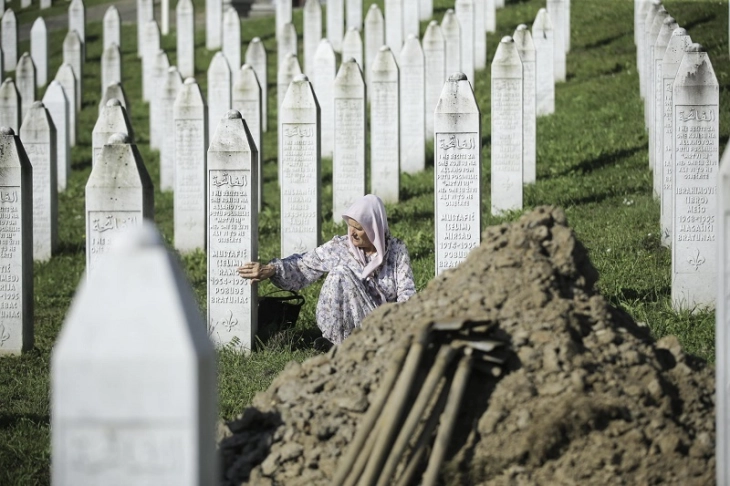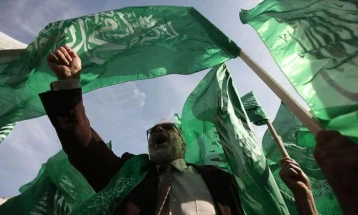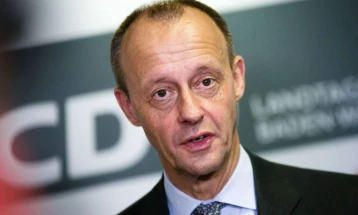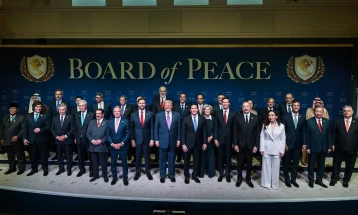Srebrenica Genocide: UN resolution sparks Balkan debate, EU stands firm
- 29 years after the Srebrenica massacre the UN General Assembly adopts a resolution on Srebrenica genocide and establishes an International Day of Reflection and Commemoration. The vote is controversial among Balkan countries, but the EU made its continous position clear in an official statement – “there is no place” in the EU for those who deny the Srebrenica genocide and try to “rewrite the history”.
- Post By Nevenka Nikolik
- 11:57, 14 July, 2024

14 July 2024
enr - Brussels
by AFP, ANSA, BTA, dpa, EFE, FENA, STA, Tanjug | 12.Jul 2024 | Key Stories
29 years after the Srebrenica massacre the UN General Assembly adopts a resolution on Srebrenica genocide and establishes an International Day of Reflection and Commemoration. The vote is controversial among Balkan countries, but the EU made its continous position clear in an official statement – “there is no place” in the EU for those who deny the Srebrenica genocide and try to “rewrite the history”.
Europe and the world commemorated the 29th anniversary of the Srebrenica genocide, often described as the worst crime committed on European soil since World War II. Ceremonies were held at the Potočari Memorial Centre in Bosnia and Herzegovina (BiH), and also in many European countries and in the United States.
The massacre took place in the Bosnian city of Srebrenica on July 11, 1995 and on subsequent days. Most of the victims were Bosniak men and boys – Bosnian Muslims – who had been separated from the women, girls and small children who were bused to territory controlled by the Bosnian army.
According to the International Criminal Tribunal for the former Yugoslavia in The Hague (ICTY), around 8,000 Bosniaks were killed in the massacre, which was perpetrated by Serbian soldiers from BiH. According to the Institute for Missing Persons of BiH, about 800 victims are still being searched for.
The remains of 14 genocide victims identified over the past year, including one minor, were buried on July 11, 2024 at the Memorial Center in Potočari, where a total of 6,751 victims have been laid to rest.

The Bosnia and Herzegovina war between Croats, Muslims (Bosniaks) and Serbs claimed approximately 100,000 lives between 1992 and 1995. Nearly three decades since the war ended, the Balkan nation remains deeply divided along ethnic lines.
The UN had placed Srebrenica under its protection in 1993. A Dutch unit of peacekeepers was tasked with protecting the refugees in the enclave. But on July 11, 1995, units of Serbs from BiH overran Srebrenica. The peacekeepers failed to protect the victims. In 2022, the Netherlands apologised to the victims’ families for their part in the failure to protect them.
Punishment of perpetrators
The ICTY and the International Court of Justice in The Hague (ICJ) have established legally that genocide was perpetrated.
The political head of the Serbs from BiH at the time, Radovan Karadžić, and Ratko Mladić, the commander of the Army of Republika Srpska, were handed life sentences by the ICTY. In addition to the leaders, at least 47 others involved were convicted of crimes in Srebrenica, receiving a total of more than 700 years in prison.
Denial of the Srebrenica genocide is virtually state policy in Serbia and in the Serbian part of Bosnia and Herzegovina (the entity in BiH where Serbs are the majority), known as Republika Srpska. The perpetrators are seen as heroes by many there
Adoption of the UN Resolution
The 1995 Srebrenica genocide will in future be marked around the world on July 11, following a vote by the United Nations General Assembly in New York, in late May this year.
The day is to be officially marked from next year, 30 years after the event.
The resolution written by Germany and Rwanda – countries synonymous with genocide in the 20th century – received 84 votes in favor, 19 against with 68 abstentions and makes July 11 “International Day of Remembrance of the Srebrenica Genocide”.
Supporters included the US, the UK, most of the EU, numerous Muslim countries and the whole of the former Yugoslavia, with the exception of Serbia, among others. China and Russia voted against the UN resolution, as did Hungary (member of EU). Three EU member states, Cyprus, Slovakia and Greece, abstained.
The vote caused an international stir and controversy among the Balkan countries. Some states had differing positions internally. For example Bulgaria, where according to media reports the cabinet of caretaker Prime Minister Dimitar Glavchev had tried to withdraw from the UN resolution.
Sources claim that a cable from Glavchev to Bulgaria’s UN Permanent Representative Lachezara Stoeva demanded a last-minute change in Bulgaria’s position before the UN vote on the Srebrenica resolution. Stoeva allegedly ignored Glavchev’s instructions and Bulgaria supported the resolution, which it had co-authored.
Commenting on Bulgaria’s position, the country’s President, Rumen Radev, said that it is inappropriate for the government to show hesitation and inconsistency given that the country was a co-author.
Tension between Serbia and Bosnia-Herzegovina
The adoption of the resolution was met with fierce opposition from the Serbian government and the leaders of Serbs from BiH, who keep downplaying the atrocity and refuse to recognise it as genocide.
The president of Serbia, Aleksandar Vučić, who traveled specifically to New York for the vote, harshly attacked the text, arguing that, far from bringing reconciliation between Bosniaks and Serbs in BiH, it will “open Pandora’s box” and foster “a division and a regional crisis in the Balkans”.
Last April, the Parliament of the Republika Srpska, one of the two entities that make up Bosnia and Herzegovina, adopted a document denying the 1995 genocide in Srebrenica, which has been acknowledged as documented and proven by the ICTY.
The document also asserts that the victims of the massacre were not civilians, as the The Hague court considered proven, but rather “prisoners of war”, and estimates their number at “between 1,500 and 2,000, at most 3,000” (compared to the 8,000 determined by the judges in The Hague).
Contrasting views within Bosnia and Herzegovina
The commemoration of the Srebrenica genocide on July 11 is not officially conducted at the state level in Bosnia and Herzegovina due to deep political divisions within the country.
For the fifth consecutive year, the Council of Ministers of Bosnia and Herzegovina did not decide to declare July 11 a day of mourning. This proposal was rejected due to the veto rights of the deputy chairman from the entity of Republika Srpska.

The National Assembly of Republika Srpska adopted a statement protesting the UN Resolution, and the president of that entity, Milorad Dodik, said that the approval of the resolution would cause irreparable damage and “mark the end of BiH”. He threatened that Republika Srpska, where Srebrenica is located, would secede from Bosnia and Herzegovina.
On the other hand, numerous local and international officials highlight the importance of commemorating the Srebrenica genocide, as it serves as a reminder of the ongoing commitment to building a safer and fairer future for all.
EU warns: “No place” in the Union for those who deny the Srebrenica massacre
The European Union’s High Representative for Foreign Affairs, Josep Borrell, and Commissioner for Neighborhood and Enlargement, Olivér Várhelyi, issued a joint statement on the genocide anniversary.
“The Srebrenica genocide is one of the darkest moments in modern European history. We call on leaders to reject divisive rhetoric and work towards truth, justice, trust, and dialogue,” they wrote in the joint statement on Tuesday. Both said that “there is no place” in the EU for those who deny the Srebrenica genocide, try to “rewrite the history” and “glorify war criminals”.
They also recalled that the EU leaders’ agreement to open membership talks for Bosnia and Herzegovina in March 2024 is a “key opportunity” for the country to “advance reforms” that will strengthen democracy.
“We reiterate our unequivocal commitment to the future of Bosnia and Herzegovina in the EU as a single, united and sovereign country,” they added.
Furthermore, the European Commission, asked on Tuesday in a press conference about the “possibility of suspending” the negotiations with Serbia if the country’s authorities opposed the condemnation of the genocide, affirmed possible repercussions on the respective evaluations for accession.
“If someone acts against the EU principles and basic criteria, this will be reflected in the Commission’s recommendations or in the decisions of the Member States when deciding the steps to follow for that specific country,” said a spokesperson for the European Commission
European leaders further highlighted that “healing the wounds of the past” requires “recognizing and teaching historical facts, honoring and remembering the victims, identifying those still missing and bringing all perpetrators to justice”.
At the conference about genocide in Sarajevo ahead of the 29th anniversary of the Srebrenica massacre, Slovenia’s President Nataša Pirc Musar stressed that the international community has a duty to stop genocidal acts. The president said this is important not only because of the atrocities that took place in Srebrenica but also because of the atrocities caused by the broken promise of “never again” around the world.
Pirc Musar called for continuous efforts to recognise and prevent genocidal acts and preserve human dignity for all, referring to the situation in Gaza. “What is going on in Gaza is a defeat of humanity. Politicians must stop looking away and must act against genocidal behaviour.”
This article is published weekly. The content is based on news by agencies participating in the enr.
Photo: enr







